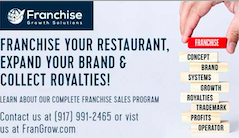PR firms specialize in acquiring earned print and digital media coverage. They also employ other digital marketing methods, such as influencers and popular hospitality reviewers, to pique the interest of the new and returning clientele. It’s this third party, “validation” that sets you apart from basic self-serving advertising.
Using PR For Restaurant Marketing
BY GARY OCCHIOGROSSO – CONTRIBUTOR TO FORBES
Photo by Campaign Creators on Unsplash
Living in the New York City market, I have grown accustomed to the noisy chatter that restaurateurs make attempting to lure guests into their restaurants. While the restaurant business has always been demanding, it’s become more so as a result of COVID -19. The urgency to get the word out has never been stronger than it is today. In my opinion, many restaurateurs have not yet embraced a new way of distributing their message. Traditional forms of advertising restrict the amount of content delivered to the consumer in any one message. I’m convinced that’s one reason why much of the restaurant advertising I hear and see is limited to the safety measures restaurant owners are taking to protect guests and employees. Of course, in this extraordinary time, safety is a tremendous concern for many consumers. However, it’s critical to get more information about your business out to attract customers. It is vital you don’t get lost in the monotony that has become restaurant advertising. Let’s not lose sight of the fact that restaurants provide an essential service and well as an enjoyable experience for their guest. People returning to dine-in restaurants certainly want safety. Still, they also expect great food, service, and a feeling of returning to normalcy.
So, how do you strategically get your brand’s voice out there in a unique way? My recommendation to my clients is to use Public Relations as the method to tell their stories. PR firms specialize in acquiring earned print and digital media coverage. They also employ other digital marketing methods, such as influencers and popular hospitality reviewers, to pique the interest of the new and returning clientele. It’s this third party, “validation” that sets you apart from basic self-serving advertising.
Earned Media Increases Visibility
Debra Vilchis, Chief Operating Officer of Fishman Public Relations puts it this way: “A TV segment or online news article where a restaurant owner is interviewed about safety and hygiene measures, including photos or video of the protocols in action, go a long way in calming people’s fears about going out to eat again. The story and video then get posted on the news channel’s website and social media. People head to the restaurant’s website or social media profiles where they find reassuring updates on what the restaurant is doing to keep employees and patrons safe. Our PR agency has been working non-stop reaching out to media on behalf of our restaurant clients since early March about all of these things.”
Whether you hire a PR firm or not, there are many steps a restaurateur can take to increase their visibility. Large franchised restaurant chains and independent operators can look to PR as an alternative or additional tool in their overall marketing strategy. I included a shortlist of methods to consider when using public relations and social media to promote your restaurant or franchise. Addressing customer concerns regarding Covid-19 while creating compelling reasons to visit your restaurant should be the goal when developing a marketing plan.
Add Your Personal Story To The Message
It all begins with telling your story. Every restaurateur, as well as the founder or franchisee of a franchised restaurant, has one. Telling your story can be as simple as talking about what inspired your menu. Are you starting a franchise that serves some of your grandmother’s recipes? Did you decide that you wanted to be a chef or a restaurant owner at a young age? These intriguing memories help you connect with potential customers by making you relatable. Telling your story through an active social media account or press release gives newspapers, websites, and other platforms a starting point. It attracts reporters who may want to put together an article or review about your restaurant. [1]
Take Advantage Of Social Media Outlets
When it comes to connecting with customers, nothing works quite like social media. Your restaurant needs to have a complete and active profile on all the platforms, including Facebook, Twitter, and Instagram. Plus, you need to ensure that your Google profile is accurate and compelling. The first thing many customers will do upon learning about your restaurant is to check out your social media presence. They’ll expect to see reviews, sample menus, pictures, and more. Social media is the most influential type of message distribution because it allows you to attract new customers with very little time, effort, and money.
Make Sure You Have News To Share
Another essential public relations method involves staying relevant and continuously having news to share. People like to be “in the know!” Wondering what’s deemed newsworthy and what isn’t? Well, are you opening a new location or franchising your restaurant? That’s news! Are you donating a portion of your proceeds to a specific charity, like a local food bank? That’s news! Are you sending out some of your wait staff or line cooks to help serve meals in a homeless shelter?.[2]
Regarding newsworthy and engaging customer information, Vilchis added: “If you think about it, consumers had little else to do than consume media 24/7, especially during the early stages of the pandemic. Smart restaurant brands and operators leveraged the opportunity to get the word out about their delivery & takeout options, safety measures they were taking, and their reopening plans. Some also did a great job of promoting goodwill to help frontline workers with free meals. Those acts of kindness went a long way with their customers. Some of our restaurant clients used PR during the pandemic to offer cooking tips or recipes – any way they could remain connected with their customers. Or they offered expertise on eating habits during the pandemic. The idea was they became a resource that news outlets wanted to turn to for information while mentioning their restaurant name on air or in print/online. It became a win-win for everyone.”
Use Influencers And Reviewers To Your Advantage
When it comes to advertising and public relations, there’s nothing quite like a 5-star review posted on social media by a local influencer. So, where do you start? Compose a list of these essential influencers and local restaurant reviewers, whom you can invite to your restaurant for a special “influencer night.” Influencers love to be wined, dined, and recognized. This event gives you a chance to ensure they receive impeccable service, an exclusive interior look, and savory food. In exchange, your restaurant will end up trending on social media, drawing in the highly coveted attention of potential customers.[3]
PR Builds Trust And Success
It should be clear that there are plenty of ways to utilize public relations and social media to build trust and attract loyal customers. Credibility, authenticity, and creativity are essential to the restaurant industry’s survival and future success, using public relations strategies to keep your restaurant’s name in the media will set you apart from the steady, mundane drumbeat of traditional advertising.
Sources:
THE RESTAURANT TIMES
PR for Restaurants: How To Publicize Your Restaurants
GOURMET MARKETING
Utilizing PR in The Restaurant Industry |https://www.gourmetmarketing.net/utilizing-pr-restaurant-industry/PR for Restaurants: Top Tips and Tricks to use Public Relations to Drive Restaurant Growth
PR for Restaurants: Top Tips and Tricks to use Public Relations to Drive Restaurant Growth












